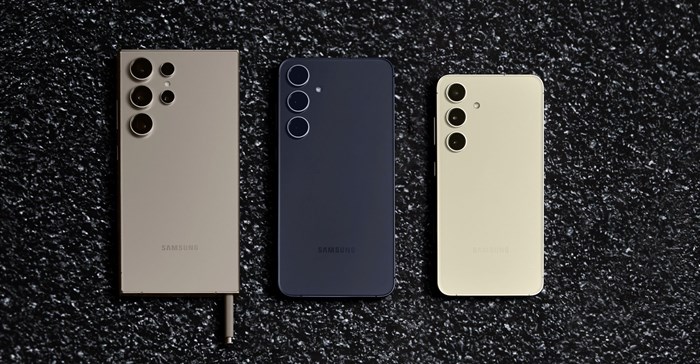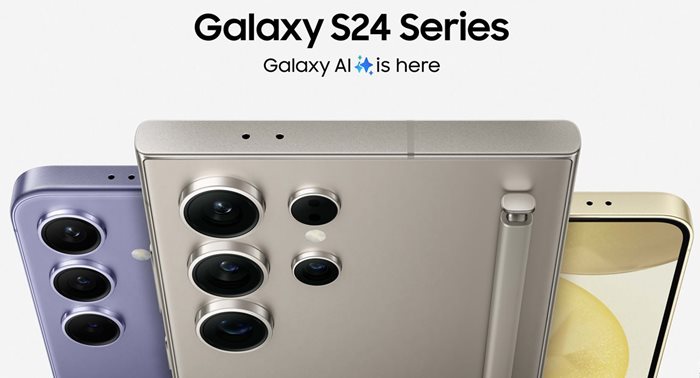
Samsung managed to increase the screen size of the S24 series over its predecessors, but in the same handset size.
“Galaxy AI” was the star of the show in the almost 90min presentation that focused more on software and AI features than the actual devices which all received appreciable spec bumps from their predecessors.
The flagship Galaxy S24 Ultra, for instance, now sports a titanium frame which makes it much lighter, and the screen is a flat pane of Corning’s new Gorilla Armor glass. Gone are the curved edges that tried to hide the sheer expanse of the front face.
New battery chemistry and manufacturing techniques also allow for all three devices in the range to gain a couple percent in battery capacity and screen size in the same size handset.
Samsung barely mentioned the impressive new Snapdragon 8 Gen 3 for Galaxy and Exynos 2400 processors by name and steered well clear of reciting any specifications like core architecture or clock speeds. There was some chatter about the ray-tracing capabilities of the GPUs, but that was it.
Gemini season
While all those physical improvements are impressive, they can be communicated best through press releases that can be parroted by the media. The challenge that Samsung had was to convey the idea of omnipresent artificial intelligence in an attractive way.
How do we as the media describe the Live Translate, Chat Assist, Transcript Assist or the concept of “circle to search”? We don’t have to because that was all Samsung could talk about and demo on stage.
What they didn’t mention outright, however, was that the underlying technology powering those features are neither Samsung developed, nor Galaxy exclusives.
The S24 series uses Google’s Gemini Nano, an on-device large language model (LLM) delivered as part of the Android 14 operating system for its on-device tasks.
Circle to search – an evolution of Google Lens which adds in enhanced computer vision – is also a Google innovation in Android and is also available on the Pixel 8 and 8 Pro. The same for the upgrades to Android Auto and Messages.
Google is aggressively shipping its AI services to as many vendors as possible in a bid to close the gap between it and OpenAI’s ChatGPT which is also integrated into Microsoft Copilot. Many of the laptops launched at CES last week will come with a Copilot button and Microsoft is making the “pro” tier of its AI assistant available to consumers via a subscription fee.
What didn’t make it
While the Galaxy S24 series launch event was chock full of AI, there were some 2024 trend features that didn’t make it onto Samsung’s newest devices.
The Qualcomm and Samsung home-baked processors integrate WiFi 7 radios for the latest high-speed wireless data connection, recharge speeds unfortunately remain the same as last year (capped at a slow by modern standards 45W) and there is no Qi2 wireless charging support – evidenced by a lack of alignment magnets that are part of the Qi2 standard.
Qi2 was developed with input from Apple and the iPhone’s Magsafe magnet array was integrated into the standard to improve induction coil alignment.
Third party accessory manufacturers like Dbrand and Moment are bridging the gap by integrated the magnets into its cases, but it is still a curious omission on Samsung’s part since the iPhone’s move to USB-C has made more accessories cross compatible.
Samsung Also halved the 10x zoom lens (240mm equivalent periscope telephoto) that it first introduced on the S21 Ultra to 5x zoom (111mm equivalent periscope telephoto) on the S24 Ultra. The underlying image sensor on the S24 Ultra’s longest lens does get a dramatic upgrade to 50MP on a much larger silicon die.
Solid update with lighter touch

Selfie camera images are an improvement
The local launch event at the Samsung Lifestyle Store in Johannesburg’s Design Quarter had products that journalists could interact with. The key takeaway is that the titanium build of the S23 Ultra is a much-needed improvement to its handling.
There is also a massive improvement to the selfie camera image signal processing across all three variants.
That AI translation feature is a miss for South Africa, though, because it doesn’t support any local languages outside of English. Spanish, French and Korean are among the launch language packs.
Local pricing is also on the steep side, but Samsung South Africa is trying to calm the price shock by offering a R400 per month reduction on contract fees if you trade in a qualifying device for the upgrade, and a R10,000 cash back if customers trade a qualifying device when purchasing an S24 cash.


































